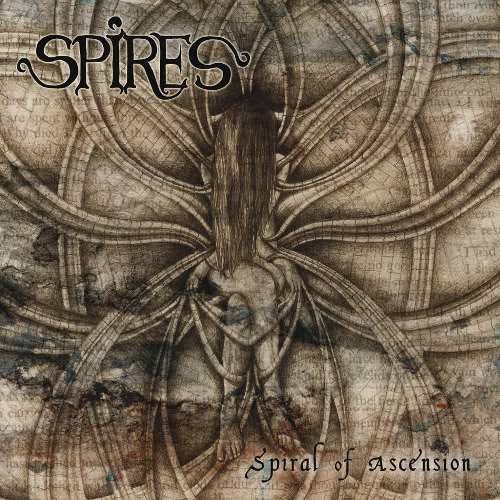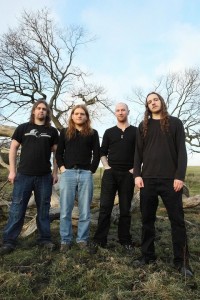
(The UK’s Andy Synn reviews Spiral of Ascension by the UK’s Spires. Say that three times really fast.)
It is always a joy to encounter an album that is so much more than the mere sum of its parts, and Spiral Of Ascension is just one such encounter. Wearing its influences proudly on its sleeves, it showcases a band unafraid to play the ‘progressive’ card right from the off, not content to simply regurgitate the sounds of their predecessors ad nauseum but instead choosing to walk the more difficult path, taking the ancestral DNA of their progenitorss and re-moulding them, progressing them if you will, in order to construct an entirely new and distinctive form of musical expression which has evolved to possess a life of its own.
Strands of genetic information from Cynic, Death, and Opeth are perhaps the most obviously expressed in Spires’ genetic make-up, these 3 influences in particular serving to encapsulate the sphere in which they reside, without limiting their sound to one of mere worship and reverence. Although making such comparisons can often be seen as a crutch for reviewers, they also serve to characterise the ‘mode’ in which the album should be listened to. What is key , though, is that for Spiral Of Ascension these connections are rarely made during the listening experience, but more reflectively afterwards when attempting to describe such a pure and rewarding musical experience via the limitations of our inadequate linguistic terms.
 Opener “Equilibrium” immediately sets the tone for the record going forward, its weaving guitars, obtuse melodies, and rippling vocal lines showcasing a willful disregard for the common tenets of song-structuring, as the group begin the mammoth task of weaving together the twisted helixes of their genetic forebears into an organic tapestry of light and sound. Throughout it’s almost 7-minute running time, the song transforms from its tentatively melodic beginnings into a whirling dervish of scattergun notes and propulsive drums, leading into a call-and-response choral refrain between guttural growls and soaring clean vocals (which thankfully returns later – demonstrating that, for all their technical and progressive leanings, the band know a great hook when they hear it), followed by a slippery, shifting solo which channels the song back into calmer, more mellifluous waters.
Opener “Equilibrium” immediately sets the tone for the record going forward, its weaving guitars, obtuse melodies, and rippling vocal lines showcasing a willful disregard for the common tenets of song-structuring, as the group begin the mammoth task of weaving together the twisted helixes of their genetic forebears into an organic tapestry of light and sound. Throughout it’s almost 7-minute running time, the song transforms from its tentatively melodic beginnings into a whirling dervish of scattergun notes and propulsive drums, leading into a call-and-response choral refrain between guttural growls and soaring clean vocals (which thankfully returns later – demonstrating that, for all their technical and progressive leanings, the band know a great hook when they hear it), followed by a slippery, shifting solo which channels the song back into calmer, more mellifluous waters.
A more immediately visceral experience, “The Infinite Descent” punches hard and fast, landing a flurry of swift jabs of post-thrash dynamism culminating in a violent uppercut of pure death metal heft. The barbed and contorted riffs channel the technical aggression of early Atheist, while the pulsing bass lines and scatter-shot drums conjure up the ghost of Sadus in their tightly written and compellingly off-kilter arrangement. During the song’s more melodic digressions, the prominent, soaring clean vocals remain accented by tempestuous screams and a more gravelly singing voice reminiscent of Byzantine’s Chris Ojeda, adding yet another ingredient to the primordial soup from which each song is born.
Unafraid to buck expected metal convention, the album is less interested in crushing its listeners with extremity and more focused on cocooning them in sound, picking them up and carrying them along with it so as to leave the listeners fundamentally changed and challenged by what they have experienced. Now, that is not to say that the record doesn’t bring the heavy when it needs to, the band just as comfortable employing a Gojira-esque stomp and pound, or a rolling, organic groove redolent of prime-era Metallica as they are at whipping up a storm of cosmic guitar-led melody or diving into soothing ambience and cleansing, evocative vocals.
The instrumental interlude of “Nightfall” showcases some beautiful acoustic playing, every note teased out with infinite care and patience, its soothing strains acting as a moment of fleeting calm within the storm of progressive instrumentation and compositional excess that embodies the album thus far.
 Definite comparisons can be made with recent Obscura during the jazzy, unusual beginning of “Broken Hourglass”, which has an odd, circus-like swing to it, its steady building of layers of distorted guitars allowing the instrumental introduction of the song time to breathe and develop. The carnival-esque atmosphere continues throughout the song’s verses, where the emotive singing provides an interesting counter-point to this most unusual of musical backings.
Definite comparisons can be made with recent Obscura during the jazzy, unusual beginning of “Broken Hourglass”, which has an odd, circus-like swing to it, its steady building of layers of distorted guitars allowing the instrumental introduction of the song time to breathe and develop. The carnival-esque atmosphere continues throughout the song’s verses, where the emotive singing provides an interesting counter-point to this most unusual of musical backings.
An interlude of more primal, death metal oriented ferocity signals the beginning of the song’s transformative phase, as it shifts away from the off-kilter dynamic of the introductory bars towards a more focused and powerful form of progressive musical expression. Several minutes of hypnotic, technical guitar work set the stage for a more aggressive section of full-on metallic catharsis, characterised by visceral growls and multi-angled riffage, while the drums provide a rock-solid foundation throughout, anchoring every twist and turn with machine-like precision. The closing minutes of the song see the band reach a melodic denouement of majestic vocal melodies and spiralling, transcendent soloing that caps the song off in a most effective manner.
Though every member of the band is a master of their particular instrumental craft, this is much more of a progressive album than it is a technical one. While the instrumentation is often technically astounding and beautifully precise in its execution, the tightly constrained, yet often borderline chaotic whirlwind of notes demonstrating their impressive technical abilities and flair, the quartet are far keener to employ their skills in a manner more unusual and unpredictable, rather than as a simple showcase of their undeniable chops.
“Symmetry” is awash with waves of gorgeous melody that recall Porcupine Tree at their softest and most contemplative. Its natural ebb and flow, rising and falling in tides of anaesthetised grace, serves as a perfect mental palette cleanser after the smorgasbord of delights that preceded it, sparkling cascades of pristine notes washing over the listener as a balm to their battered senses.
 On the other side of the coin, “Martyr”, despite its 10-minute run-time, retains an almost laser-like focus on delivering the winding, complex guitar parts that have become such a recognisable staple of the Spires sound. Every contorted riff and unexpected structural shift builds upon its predecessor, pulling the listener in so many different directions that it’s both dizzying and enervating at the same time. Even during the more atmospheric interludes, seemingly designed to give breathing room to the embattled audience, the guitars continue to flow languidly around the listener in enigmatic patterns of shifting shadows and unseen undercurrents, their complexities camouflaged by the shining melodies which brighten the scene. Arch, post-thrash inflections give the song its undeniable momentum, one that doesn’t race away with impunity, yet is irresistible in its employment of subtle force and power.
On the other side of the coin, “Martyr”, despite its 10-minute run-time, retains an almost laser-like focus on delivering the winding, complex guitar parts that have become such a recognisable staple of the Spires sound. Every contorted riff and unexpected structural shift builds upon its predecessor, pulling the listener in so many different directions that it’s both dizzying and enervating at the same time. Even during the more atmospheric interludes, seemingly designed to give breathing room to the embattled audience, the guitars continue to flow languidly around the listener in enigmatic patterns of shifting shadows and unseen undercurrents, their complexities camouflaged by the shining melodies which brighten the scene. Arch, post-thrash inflections give the song its undeniable momentum, one that doesn’t race away with impunity, yet is irresistible in its employment of subtle force and power.
What perhaps makes this album is that it is put together like a tapestry, a long-form story where each chapter can be digested individually, but only gives the barest hint of the true majesty of the whole thing, absorbed in its entirety. Perhaps it is only when one steps back, having experienced the album piece by piece, that one truly becomes aware of the greater totality of the picture that has been painted and the grand scale of the record’s musical ambitions.
Penultimate track “Spiral Of Ascension” is a 14+ minute saga of rolling metallic riffs and sizzling leads, the quartet utilising every shade of their verdant and vibrant colour palette to paint a compelling picture of majestic grandeur and powerful undercurrents. Taut riffs and electrifying solos abound, while succulent bass-lines tease the ear with subtle counter-melodies and flowing arrangements, all whilst the drums masterfully control and conduct the technicolour chaos.
In one epic song the band manage to amalgamate their myriad of influences into a grandiose symphony of extended instrumental movements and a multiplicity of voices. There is a primal savagery to the cathartic growls that stands in stark contrast to the uplifting cleans vocals, which seize the spotlight time and again, yet even the acoustic ambience of the song’s most reflective moments is possessed of an ominous and dark undercurrent which ties the song together despite its many shifts in style and approach. Dizzying solos spark off iron-clad riffs and scathing waterfalls of crackling distortion, the band never foregoing atmosphere and mood even as they explore the outer limits of their own musical abilities. The song closes with an extended jam of jazzy, semi-acoustic melody, over which a crystal-clear singing voice holds court, the grand saga culminating in a joyful display of restrained magnificence and blissful, progged-out experimentation.
 Effervescent instrumental “A New Prayer” allows the group to end their musical odyssey on a triumphant note, equal parts melody and dissonance combining into a singular display of razor-sharp technique and enigmatic, almost ambiguous shifts in style and direction, which somehow always tie together in order to serve the grand scheme.
Effervescent instrumental “A New Prayer” allows the group to end their musical odyssey on a triumphant note, equal parts melody and dissonance combining into a singular display of razor-sharp technique and enigmatic, almost ambiguous shifts in style and direction, which somehow always tie together in order to serve the grand scheme.
It’s perhaps only the tiniest bit of hyperbole to declare that this record is able to stand proudly toe-to-toe with legendary albums like Focus, Human, and Still Life , and though, perhaps by virtue of the times we live in, it may not have quite the same impact, its authors can be fully justified in taking limitless pride in their creation.
EDITOR’S NOTE: Visit Spires on Facebook via this link. There, you can download “The Infinite Descent” for free. The album as a whole can be purchased in CD form here. Check out three tracks from the album using this widget:

Awesome find Andy. I’m really liking this.
This is very good.
I checked this out after it appeared on your best-of list for last year. Long story short, I was mightily impressed! Easily one of the best releases of last year, and one that inspires great hopes for the band’s future.